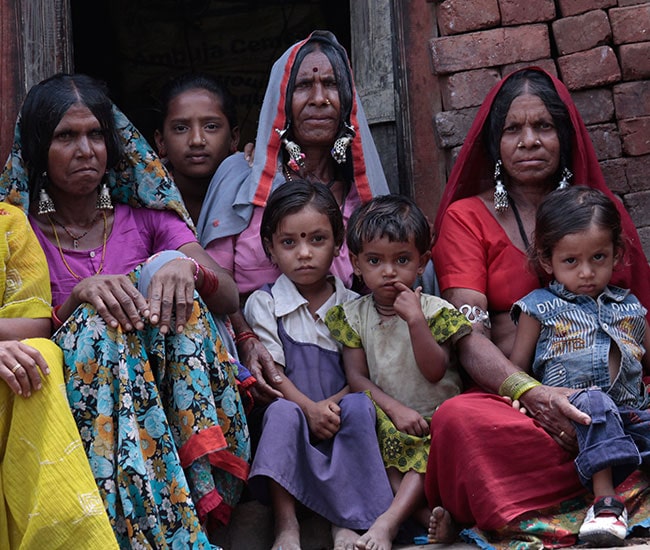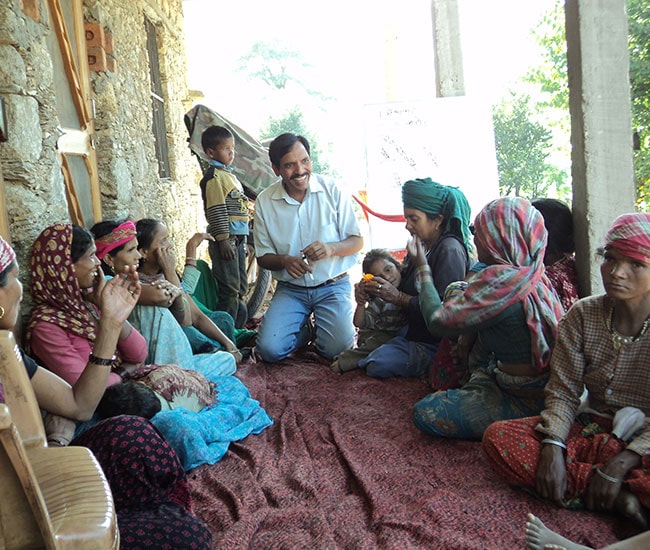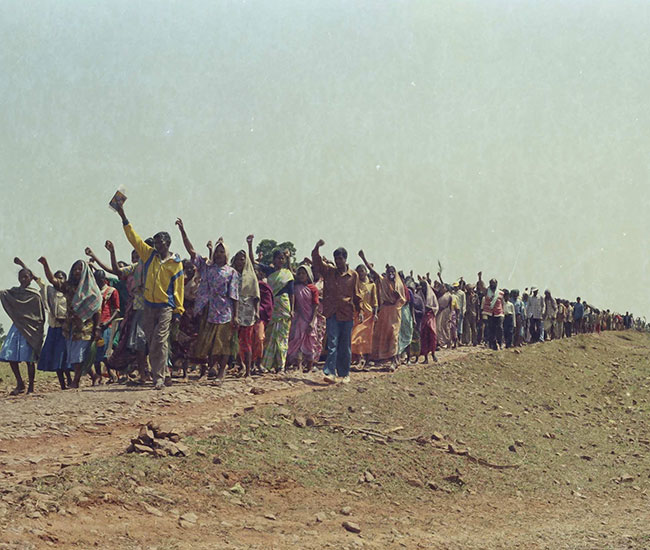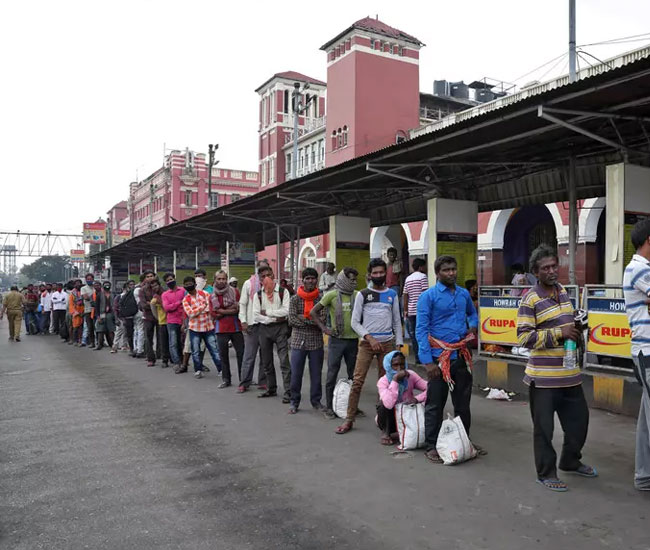
Adivasi Chetna Sangathan
Dhenkanal is one of the centrally positioned districts of Odisha and is surrounded by Keonjhar, Jajpur, Cuttack and Angul districts. Surrounded by mountains and dense forests, these regions are abundant in natural resources. The economy of the districts is predominantly agrarian. A larger section of the rural population (mostly adivasis) holds very little or no agricultural land. They work as agricultural labourers and depend on daily wages.
Adivasi Chetna Sangathan (ACS) was formed in October 1996, with 209 adivasi families from 10 villages in Dhenkanal district under the leadership of Amulya Nayak. At its inception, it was decided that the main objectives of ACS would be to safeguard the rights and dignity of adivasis along with bringing about all-round development through struggle as well as constructive work.
ACS is now working in more than 50 villages situated as far as 90 kms away from the district headquarters. The area is located near the Dadraghati Irrigation Project. Although these villages are very close to the National Thermal Power Corporation’s (NTPC) plant in Angul and Talcher Thermal power plant, the residents have never seen electricity in their villages. Talcher is the nearest town, which is 22 kms away.
The work of the sangathan during the course of time has spread to nearby areas and inspired people of more than 150 villages in nearby Angul district to form Malyagiri Adivasi Sangharsh Manch (MASM) in 2002. ACS and MASM together have 13 full time karyakartas including Amulya.
Other than Santhal, Ho and Munda, there are Kolha, Matia and Majhi tribal groups residing there. Most of the tribals in this region migrated from Mayurbhanj district in the 1950s and have a history of being exploited by local high caste Hindus. The tribals depend on daily wages for most of the year. They are engaged in stone cutting, dry-wood cutting, agricultural work, soil digging, etc.
ACS and MASM have also formed a theatre group based on Augusto Baol’s ‘Theatre of the Oppressed’.
Land Struggle
The tribals in this area are migrant settlers who were at the mercy of local brokers, mafia and corrupt government officials who were collecting huge amounts of money in exchange of homestead land patta. ACS demanded the provision of homestead land and other government facilities to fulfill the basic needs of people. The organization fought tooth and nail against many groups with vested interests.
Forest Conservation
Rapid deforestation and environmental degradation was going on in Dadraghati area since the construction of the Dadraghati MIP in 1980. ACS helped spread the message regarding protection of the forest and environment. 20 villages of ACS have been protecting about 400 acres of forest near their villages since inception of the sangathan. The sangathan facilitated the afforestation of Tulukpatia and Verobania forests, which had been destroyed over the years. ACS has fought a number of cases where local mafia put forth false orders for stone quarrying which would’ve destroyed village forests.
The sangathan has also been working towards raising the compensation amount given to farmers in case of destruction of crops due to elephant attacks. Crop destruction amounting to lakhs of rupees have left farmers hapless with no option but guard their paddy field round the clock. As per the state government the compensation amount for damage of crops is Rs.2500 per acre while a farmer spends more than Rs. 5000 cultivating an acre. The sangathan has also been simultaneously working on protecting the habitat of the elephants. ACS and MASM have formed 44 forest protection committees which protect more than 4400 acres of forests.
Panchayati Raj
The sangathan has been able to successfully involve the administration in fixing the menace of passing false resolutions in gramsabhas where tribals are not properly represented. ACS members participate in regular training sessions where they learn about the politics of the state as well as the rights and duties of every citizen. This plays a crucial role in helping them exercise their rights and resisting upper caste oppression.
During the panchayat elections, both sangathans organise voter awareness campaigns through padayatras and village level meetings stressing on a fair election.
Stories
Education
Till 1996 there were no schools in the area. ACS took up this issue, encouraging villagers to start their own schools and asked educated tribal youths to come forward to teach. Each student contributed in cash or kind towards the teacher’s remuneration. Till date, ACS has been able to pressurize the government to start as many as 60 schools under District Primary Education Programme and Education Guarantee Scheme resulting in the education of more than 1200 tribal children.
Preserving Tribal Culture
ACS has been organizing a tribal festival at Kendumunda every year where about 1000 tribal men, women and children along with 1500 non-tribals participate. Events like long jump, high jump, arrow shooting, stick pulling, rope pulling, leaf plate stitching are organised along with a tribal music competition where tribal musical instruments are played and songs are sung both individually and in groups. The festival is attended by several administrative officers of the Block and the district.
A theatre festival is also held by ACS where more than 12 tribal theatre teams from areas where ACS works and other villages perform short plays in Santhali language which is highly appreciated by the largely Santhali speaking audience. All the plays are educational and raise contemporary issues faced by the tribal society. The need for revival and the importance of tribal culture and language is stressed by both these annual features. The entire festival is managed by people’s contribution and helps ACS organically expand its reach.
Opposing Stone Mafia Groups
The people of Mohanpasi and Kendumunda together protect a small mountain that is situated in the middle of both the villages. The hillock, covered by dense forests, has been named ‘Chetana Mundia’ by the sangathan. In November 1999, stone mafia groups managed to obtain a lease order to have stone quarry at Mohanpasi and began blasting stone in the mountain with a compressor machine. When the people of Mohanpasi and Kendumunda protested it, the mafia threatened to file a case for loss of government revenue. This did not deter the people who seized the compressor machine and stopped work. The next day ACS conducted an agitation at Parjang Tahsil office and demanded the Tahsildar to cancel the lease based on the monumental damage it caused to the environment. On 20th November the Tahasildar and Revenue Inspector visited the spot and found the stone quarry lease has been given for another spot and not for that particular mountain. The mountain blasting procedure then stopped and the lease order for the entire Mohanpasi area was cancelled. The ACS members (local villagers) took it upon themselves to protect as well as regenerate the forests saved from the mafia. The sangathan is also protesting against other illegal stone quarries in nearby areas.




